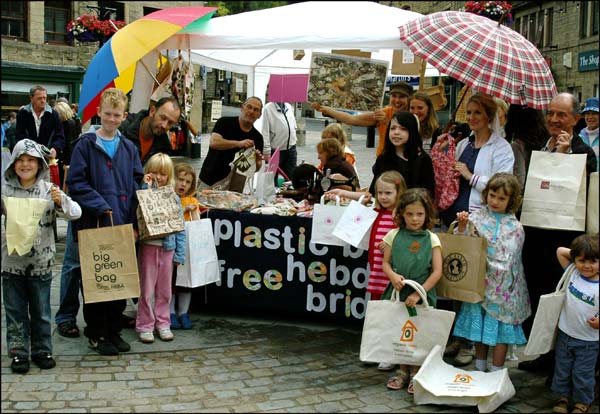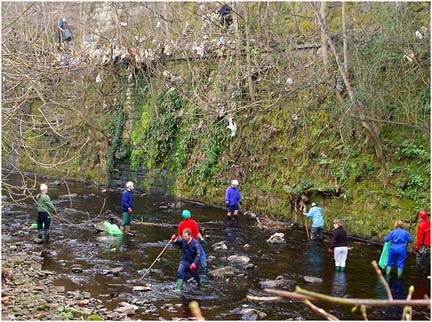 |
|
HEBDEN BRIDGE GOES PLASTICBAGFREE
Update: Saturday, 22 September 2007
PlasticBagFree Hebden Bridge features in today's main Guardian news, including a half page picture of Bag Lady Louise (not shown online). BBC's Politics Show have also approached the Hebweb about the first month of being bag free. "The BBC Politics Show in Yorkshire is doing an item next week on Hebden Bridge - is it the greenest and most ethical town in the universe?"
Update: Saturday, 1 September 2007
Today sees the start of the plasticbagfree Hebden Bridge initiative. Fifty three shops currently using plastic bags have pledged to support the initiative, while over 20 shops already do not use plastic bags.
Shops and traders around the town have been working on finding alternatives to the plastic bag, including shops asking for returnable deposits on bags, providing string bags, baskets and a newly launched cotton tote bag featuring the plasticbagfree Hebden Bridge logo which should be available from Ruby Shoesday and the Co-op as well as other shops.
Recycle Calderdale has provided funding for shop starter packs of ‘Little Green Bags’ as an alternative to plastic bags which will be provided to shops for the day. These are fully compostable bags which will biodegrade in home compost bins. A small charge will be made for these in the future to cover costs.
Local residents have received or are receiving a leaflet about the initiative and a free Co-op fair trade cotton bag to get them started.
"We are asking shoppers to come prepared with their own bags, or to be willing to pay 5 – 10p for a bag, to help the initiative work… we want to keep Hebden Bridge’s environment beautiful and we want to keep the town on the map as a great place to visit, live, shop in and work in. If we can all work together to make the town plasticbagfree then we’ll be Europe’s largest plastic bag free town” said the Bag Ladies, local residents who have worked together to pioneer the initiative. Residents are being asked to use any plastic bags they do have to sort their Kerbside recycling, rather than throwing them away.
“The key is to reduce, reuse and recycle… so we can reduce bag use by using alternatives, reuse bags we do get, for example, to sort our Kerbside recycling, or to use them again and again, and then finally to recycle them.”
MAKE HEBDEN BRIDGE PLASTICBAGFREE
Update: Sunday, 12 August 2007
Recycle for Calderdale has just offered to provide every Hebden Bridge shop keeper with a starter pack of 100 free waste potato starch carrier bags to help launch plasticbagfree Hebden Bridge on Sept 1st 2007.
Update: Tuesday, 31 July 2007
Plastic Bag Free Hebden Bridge website
See also: Modbury - first UK plastic bag free town
Update: Wednesday, 18 July 2007
Hebden Bridge to be a declared plastic bag free town from 1st September, 2007 - the largest town in Europe to do so to date.
Th Bag Ladies have succeeded in getting on to the national media and local TV - with their campaign.
From The Times
"Green town bans the plastic bag
The campaign to ban plastic bags from shops is gathering pace, with Hebden Bridge, West Yorkshire, the latest town to sign up to the cause. From September, 109 shops will ban the bags and the Coop is giving a free Fair Trade cotton bag to every household" (18 July 2007)
 Bag Lady Emma Leeming on Look North (16th July 2007) -
see clip
Bag Lady Emma Leeming on Look North (16th July 2007) -
see clip
Courier: Hebden Bridge becomes largest town in Europe to ban plastic bags (16th July 2007)
MAKE HEBDEN BRIDGE PLASTICBAGFREE

Update: Sunday, 24 June 2007
The campaign launches in George's Square
ON SUNDAY JUNE 24th
Friday, 22 June 2007
Sunday 24 June will see Hebden Bridge’s first step to go plasticbagfree.
The town square will return to its textile roots as people get the chance to make their own reusable shopping bags. Between 11am and 3pm people will be able to make use of sewing machines in the square to run up their own shopping bags. “This is a great way to raise the town’s profile and to get involved with making a difference to our environment.” said Nader Fekri the mayor of Hebden Royd Council.
Hebden Bridge traders and residents are rising to the challenge to abandon plastic bags. Already, 25 of the town’s 100 shops have shunned plastic bags. Maskills the butchers, Valley Stores, Holts the grocers, Studio Seven Art Supplies and Lamberts the printers are amongst the many well established Hebden businesses that are keen to go plasticbagfree. The town intends to send a bag to every household with a leaflet explaining the reasons for ending the use of plastic bags in the town, and a Hebden Bridge bag will be on sale by the autumn.
Hot on the heels of Modbury in Devon, Britain’s first plastic bag free town, Hebden Bridge is lining up to be the largest town in Europe that is plasticbagfree. Proud of its independent shops, and recognised by the Clone Towns survey as the least cloned town in the UK, and labelled the world’s fourth most funky by BA’s High Life magazine, Hebden Bridge has a reputation for conserving it’s environment and being at the forefront of providing a unique and attractive place to visit and shop.
The movement to ban plastic bags is growing, with a national campaign for a plasticbagfree Christmas afoot, moves by the country’s largest traders to reduce their use of plastic bags and mounting pressure on government to follow in Ireland’s footsteps with a plastic bag tax.
The Hebden Bridge campaign will be advising residents to keep their old bags to use to sort items in their Kerbside Recycling boxes; meanwhile, it’s back to the sewing machine for the residents of Hebden Bridge.
Keep an eye out for more news over the summer as Hebden Bridge builds up to plasticbagfree day. For more information about the campaign contact the bag ladies on 01422 844350, 01422 842791 and bag.ladies@hotmail.com

Volunteers clear plastic bags and other rubbish from the Hebden Water and the supporting wall below Keighley Road during this year's Spring Cleanup
Plastic Facts
80% of marine waste comes from land based sources and up to 80% of that is plastic.
Most of the marine debris in the world is comprised of plastic materials. The average proportion varies between 60 to 80% of total marine debris.
Gregory, M.R., Ryan, P.G. 1997. Pelagic plastics and other seaborne persistent synthetic debris: a review of Southern Hemisphere perspectives. In Coe, J.M., Rogers, D.B. (Eds.), Marine Debris- Sources, Impacts, Solutions. Springer-Verlag, New York, pp.49-66.
Nearly 80% of marine debris comes from land-based sources.
Faris, J. and Hart, K., Seas of Debris: A Summary of the Third International Conference on Marine Debris, N.C. Sea Grant College Program and NOAA, 1994, title page.
Most of the land-based rubbish is conveyed to oceans through storm drains. The main sources of plastic and other types of human-made debris in urban runoff include: litter (mostly bags, packaging and single-use disposable products), industrial discharges, garbage transportation, landfills, construction debris, and debris from commercial establishments and public venues.
Algalita Marine Research Foundation
Because plastics do not biodegrade, no naturally occurring organisms can break these polymers down. Instead, plastic goes through a process called photodegredation, where sunlight breaks down plastic into smaller and smaller pieces until there is only plastic dust. But plastic always remains a polymer. The ocean is especially susceptible to plastic pollution. It takes longer for the sun to break apart plastic in the ocean than on land because of the oceans’ cooling capacity. Plastic pieces can attract and hold elements like PCB and DDT. PCBs are persistent organic pollutants and have entered the environment through both use and disposal. PCB’s are banned because they are carcinogenic. DDT is an organochlorine insecticide that was banned in the UK in 1984.
Algalita Marine Research Foundation
Sharks with plastic rings wrapped around their gills and mouths caught in southeast Brazil.
Sazima, I. Gadig, O.B.F. Namora, R.C. Motta, F.S. Plastic debris collars on juvenile carcharhinid sharks (Rhizoprionodon lalandii) in southwest Atlantic. Marine Pollution Bulletin, Volume 44, Issue 10, October 2002, pp. 1149-1151
The world produces over 200 million tonnes plastic annually. Around half of this is used for disposable items of packaging that are discarded within a year. This debris is accumulating in landfill and the problem is growing.
Dr Richard Thompson. Marine Ecologist at the University of Plymouth.
UK beach contain on average 2000 pieces of litter for every kilometre.
Marine Conservation Society.
Globally, over 1 million and 100 thousand marine mammals and turtles die every year from entanglement or ingestion of plastic.
LAIST. 1997
There are 1.2 trillion plastic carrier bags used world wide each year
- that’s 300 bags for every adult on the planet
- one million bags per minute
- on average we use each plastic bag for 12 minutes before disposing of it
United Nations Environmental Programme.
See also: Hebweb discussion thread
We try to make sure that the Hebden Bridge Web news is correct, but if you are aware of any errors or omissions, please email us If you have comments on Hebweb news please make a contribution to our discussion forum More news from the Hebden Bridge Web
|